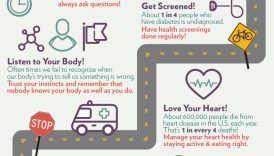The Ultimate Guide to Starting Your Journey to a Healthier Life

Importance of Health
Health is often celebrated as one of life’s greatest treasures, and for good reason. Without it, even the simplest joys can feel burdensome. Establishing and maintaining good health is vital not only for physical well-being but also for mental and emotional balance. When individuals prioritize their health, they tend to experience enhanced energy levels, improved mood, and better overall productivity. Consider this: when someone feels healthy, they are more likely to engage in social activities, pursue hobbies, and embrace new challenges. This interconnectedness between health and happiness forms the foundation for a fulfilling life.
- The Ultimate Guide to Starting Your Journey to a Healthier Life
- Importance of Health
- Setting Your Goals
- Nutrition
- The Basics of a Healthy Diet
- Meal Planning Tips
- Fitness
- Starting an Exercise Routine
- Incorporating Physical Activity
- Mental Health
- Stress Management Techniques
- Establishing a Self-Care Routine
- Sleep
- Importance of Quality Sleep
- Tips for Better Sleep Hygiene
- Hydration
- Benefits of Staying Hydrated
- How to Drink More Water
- Mindfulness
- Practicing Mindful Eating
- Incorporating Meditation
- Social Connections
- Building a Support Network
- Importance of Healthy Relationships
- Time Management
- Balancing Work and Personal Life
- Prioritizing Self-Care
- Tracking Progress
- Using Apps and Tools
- Celebrating Milestones
Setting Your Goals
Setting achievable health goals is crucial in this journey. Goals provide direction and motivation, turning aspirations into actionable steps. To get started, individuals can follow these simple tips:
- Be Specific: Instead of vague statements like “I want to be healthier,” aim for specifics like “I will exercise for 30 minutes, five times a week.”
- Set Measurable Objectives: Include metrics to track progress, such as weight loss targets or fitness milestones.
- Be Realistic: Everyone’s journey is unique; setting attainable goals prevents frustration.
- Define a Timeline: Establish deadlines to provide accountability.
By establishing a clear path and maintaining focus on these health priorities, individuals can foster a sustainable and enjoyable lifestyle.
Nutrition
The Basics of a Healthy Diet
When it comes to nutrition, understanding the basics of a healthy diet lays the groundwork for a healthier lifestyle. A balanced diet typically includes a variety of food groups, which help to ensure that the body receives essential nutrients. A well-rounded plate should feature:
- Fruits and Vegetables: Aim for a colorful assortment to maximize vitamins and minerals.
- Whole Grains: Opt for brown rice, whole-grain bread, and oats for fiber and energy.
- Lean Proteins: Include sources like chicken, fish, beans, and lentils for muscle growth and repair.
- Healthy Fats: Incorporate avocados, nuts, and olive oil in moderation for heart health.
Prioritizing these elements will not only nourish the body but also contribute to better mood and energy levels.
Meal Planning Tips
To make healthy eating more manageable, meal planning emerges as an invaluable tool. It can save both time and stress in the kitchen. Here are some handy meal planning tips:
- Plan Weekly: Dedicate a day to outline meals for the week ahead, ensuring a balanced approach.
- Prep Ingredients: Spend some time chopping vegetables or cooking grains in advance for easy access.
- Create a Grocery List: Stick to your list to avoid impulse purchases of unhealthy options.
- Incorporate Leftovers: Utilize leftover ingredients creatively to minimize waste and save time.
For example, if you roast vegetables on Monday, you can use them in a stir-fry on Tuesday or in a salad on Wednesday. This strategy not only supports nutrition but can also make healthy eating enjoyable and less daunting.
Fitness
Starting an Exercise Routine
Embarking on a fitness journey can feel daunting, but starting an exercise routine is a rewarding first step toward better health. Begin by assessing personal fitness levels and identifying what types of exercise are enjoyable. Whether it’s dancing, jogging, or cycling, finding an activity that resonates will make sticking with it easier. As a practical approach, beginners can consider:
- Setting Realistic Goals: Start with achievable targets like “30 minutes of exercise three times a week.”
- Finding a Workout Buddy: Exercising with a friend not only enhances motivation but also makes workouts more enjoyable.
- Exploring Different Activities: Try out classes or local sports to discover new passions.
One inspiring anecdote involves a colleague who started jogging just ten minutes daily but gradually increased to 5K runs, showcasing how small beginnings can lead to significant progress.
Incorporating Physical Activity
Once an exercise routine is established, the next step is integrating physical activity into daily life. This can easily be achieved with creative strategies:
- Choose Walking: Whenever possible, opt for walking instead of driving, whether it’s for commuting or running errands.
- Active Breaks: Utilize a few minutes during work to stretch or take brisk walks to boost circulation and energy.
- Engage in Hobbies: Activities like gardening, dancing, or playing with pets can burn calories while keeping the experience enjoyable.
By making physical activity a natural part of life, individuals can elevate their fitness without feeling overwhelmed, creating a sustainable and healthy lifestyle.
Mental Health
Stress Management Techniques
As the journey toward a healthy lifestyle continues, maintaining mental health is equally as important as physical fitness. Stress management is a critical aspect to consider, as stress can affect overall well-being significantly. Incorporating simple techniques can alleviate stress and foster a sense of calm.
- Deep Breathing: Take a moment to breathe deeply in through the nose and out through the mouth; this can quickly reduce anxiety.
- Mindfulness Meditation: Practicing mindfulness for just a few minutes daily can help center thoughts and promote relaxation.
- Physical Activity: Remember how exercise releases endorphins? Try to fit in a quick workout session when stress hits.
One personal experience was using a guided meditation app during a particularly hectic week, and finding those ten minutes daily to be a game-changer for my mindset.
Establishing a Self-Care Routine
In addition to stress management, establishing a self-care routine is essential for nurturing mental health. Self-care can take various forms, so it’s vital to find what resonates personally. Here are a few suggestions to inspire:
- Set Boundaries: Identify limits regarding work and social commitments to protect personal time.
- Engage in Hobbies: Devote time to activities that spark joy, whether painting, reading, or cooking.
- Unplug from Technology: Schedule “tech-free” times to reduce overstimulation and promote relaxation.
By intentionally incorporating self-care into daily life, individuals can cultivate resilience, enhance emotional well-being, and foster a greater sense of fulfillment. Embracing these practices doesn’t just benefit the individual but can create a ripple effect of positivity in their relationships and surroundings.
Sleep
Importance of Quality Sleep
Transitioning from mental health, it’s crucial to highlight the significance of quality sleep. Sleep is often underestimated in its impact on overall health and well-being. It plays a vital role in cognitive function, emotional regulation, and even physical health. When individuals are well-rested, they tend to experience improved concentration, mood stability, and immune function. A personal anecdote can illustrate this: after consistently getting seven to eight hours of sleep nightly, one might notice how much easier everyday tasks become – from completing work projects to engaging meaningfully in conversations. Conversely, insufficient sleep often leads to irritability and decreased productivity.
Tips for Better Sleep Hygiene
To cultivate better sleep, it’s essential to adopt effective sleep hygiene practices. Here are some strategies designed to enhance the quality of rest:
- Maintain a Consistent Schedule: Go to bed and wake up at the same time daily, even on weekends.
- Create a Relaxing Environment: Keep the bedroom dark, cool, and quiet, and make it a sanctuary for sleep.
- Limit Screen Time: Avoid screens at least an hour before bedtime as blue light can interfere with sleep hormones.
- Watch Food Intake: Limit caffeine and heavy meals before sleep to prevent disruptions.
By implementing these tips, individuals can pave the way for restorative sleep, subsequently enhancing their mental and physical health. Prioritizing sleep isn’t just about rest; it’s about fostering a life where one thrives both mentally and physically.
Hydration
Benefits of Staying Hydrated
Following the importance of quality sleep, hydration emerges as another vital pillar of health. Staying hydrated is essential for nearly every bodily function, from regulating temperature to supporting digestion. Additionally, adequate hydration significantly influences energy levels and mental clarity. For instance, many people might not realize that even mild dehydration can lead to fatigue and impaired focus. A personal experience of feeling sluggish during a busy day can often be alleviated simply by drinking enough water. Moreover, proper hydration can promote clear skin, aid in weight management, and assist in flushing out toxins.
How to Drink More Water
To enjoy the myriad benefits of hydration, here are practical ways to increase water intake throughout the day:
- Carry a Water Bottle: Keeping a reusable bottle handy encourages regular sipping.
- Infuse with Flavor: Adding slices of fruits like lemon or cucumber makes drinking water more enjoyable.
- Set Reminders: Use phone alerts to remind oneself to drink water regularly.
- Track Intake: Apps or a simple journal can help visual accountability of daily consumption.
By making a conscious effort to stay hydrated, individuals can enhance their overall health, vitality, and well-being, ensuring that hydration supports their journey toward a balanced lifestyle.
Mindfulness
Practicing Mindful Eating
As we shift our focus from hydration, it’s important to embrace the concept of mindfulness in our daily habits. One powerful way to practice mindfulness is through mindful eating. This practice encourages individuals to savor each bite, leading to a more rewarding and conscious dining experience. To truly engage in mindful eating, one might consider:
- Eliminating Distractions: Setting aside phones and TV to focus solely on the meal at hand.
- Chewing Slowly: Taking time to chew each bite thoroughly can enhance flavor enjoyment and promote better digestion.
- Listening to Hunger Cues: Learning to identify when we are genuinely hungry versus eating out of boredom can transform eating habits.
Personally, adopting mindful eating has changed how I relate to food, cultivating a deeper appreciation for the flavors and textures of what I consume.
Incorporating Meditation
In addition to mindful eating, incorporating meditation into daily life can significantly enhance overall well-being. Meditation helps calm the mind and bring awareness to the present moment, providing a sanctuary from the busyness of life. To seamlessly integrate meditation, one can:
- Begin with Short Sessions: Start with just 5-10 minutes daily to build consistency.
- Use Guided Meditations: Apps can provide structure for beginners, making the practice accessible and enjoyable.
- Practice Deep Breathing: Focusing on breathing can be a simple yet effective way to meditate anywhere.
By weaving mindfulness into both eating and meditation practices, individuals can foster a richer, more mindful existence, ultimately leading to greater satisfaction in daily life and improved mental health.
Social Connections
Building a Support Network
Transitioning from mindfulness, it’s essential to delve into the significance of social connections. Building a support network can immensely impact mental health and well-being. Surrounding oneself with positive influences not only provides encouragement during challenging times but also fosters a sense of belonging. Here are effective ways to create a supportive network:
- Reach Out to Friends and Family: Regular contact with loved ones can deepen relationships and instill a sense of security.
- Join Community Groups: Participating in clubs or volunteer organizations can introduce new connections and shared interests.
- Attend Workshops or Classes: Learning something new alongside others can spark friendships and broaden social horizons.
For example, after moving to a new city, joining a local book club provided a wonderful opportunity to meet like-minded people, paving the way for friendships.
Importance of Healthy Relationships
Healthy relationships are the backbone of a supportive network. They nurture emotional health and can significantly reduce stress levels. Quality over quantity is key; investing in relationships that promote mutual respect and understanding is vital. To foster healthy relationships, one can:
- Communicate Openly: Foster honesty and transparency to build trust with friends and loved ones.
- Practice Empathy: Understanding and respecting others’ viewpoints creates a deeper bond.
- Set Boundaries: Respecting personal boundaries ensures that relationships remain balanced and healthy.
By cultivating a strong support network and prioritizing healthy relationships, individuals can enhance their resilience and joy in life, creating a fulfilling social landscape that contributes significantly to overall well-being.
Time Management
Balancing Work and Personal Life
As we transition from nurturing social connections, the importance of effective time management cannot be overstated. Balancing work and personal life is essential for maintaining overall well-being. Without a clear strategy, the lines between work and personal time can blur, leading to burnout. Here are practical tips for achieving balance:
- Set Clear Work Hours: Designate start and end times for your workday to establish boundaries.
- Create a Daily Schedule: Prioritize tasks and allocate specific time slots for each to enhance focus and efficiency.
- Learn to Say No: Avoid overcommitting by respectfully declining tasks or invitations that do not align with personal priorities.
Personally, implementing a routine helped me regain control over my time, ultimately leading to more fulfilling evenings spent with family or pursuing hobbies.
Prioritizing Self-Care
Further, prioritizing self-care is crucial in the realm of time management. With busy schedules, it’s easy to neglect self-care routines. However, setting aside time for oneself is essential for recharging and maintaining overall health. To effectively incorporate self-care, consider:
- Schedule ‘Me Time’: Block out dedicated time in your calendar for self-care activities like reading, yoga, or taking a leisurely walk.
- Engage in Relaxation Techniques: Activities like meditation, journaling, or warm baths can help combat stress and rejuvenate the mind.
- Review and Adjust Regularly: Continuously assess personal needs and adapt routines to ensure that self-care remains a priority.
By mastering time management and prioritizing self-care, individuals create space for personal happiness and fulfillment, forging a sustainable path in both work and personal life.
Tracking Progress
Using Apps and Tools
As we wrap up our discussion on time management, tracking progress is a fundamental part of achieving any health and wellness goal. Utilizing apps and tools can streamline this process and make it enjoyable. With a plethora of technology at our fingertips, individuals can stay organized and motivated. Here are some popular types of apps and tools that can be beneficial:
- Fitness Trackers: Apps like MyFitnessPal or Fitbit allow users to monitor exercise routines, calorie intake, and even sleep patterns.
- Habit Trackers: Utilizing apps such as Habitica or Strides can help maintain accountability for daily habits and behaviors.
- Goal Setting Apps: Digital planners or goal tracking apps can assist in breaking larger goals into actionable steps, ensuring consistent progress.
For instance, using a health tracking app provided me with detailed insights into my habits, making it easier to adjust my lifestyle accordingly.
Celebrating Milestones
In addition to tracking progress, celebrating milestones is crucial in reinforcing motivation and acknowledging achievements. Recognizing even small victories can boost morale and sustain momentum. Consider these ideas for celebrating milestones:
- Treat Yourself: After reaching a goal, reward yourself with something enjoyable, like a spa day or a new book.
- Share Achievements: Celebrate with friends or family by sharing your successes; their support can enhance the joy of accomplishment.
- Reflect on Progress: Take time to look back and appreciate how far you’ve come, writing down reflections can help solidify the journey.
By effectively tracking progress and celebrating milestones, individuals not only stay focused on their goals but also create a positive and fulfilling journey toward better health and well-being.




